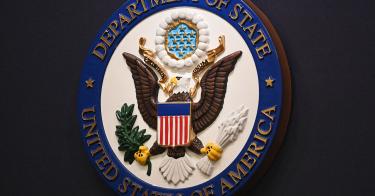The U.S. Department of State has appointed Desirée Cormier Smith to a newly created post: Special Representative for Racial Equity and Justice. This raises several questions.
The first question is: Does State really need another special representative?
In addition to hundreds of ambassadors, the department already boasts a whopping 55 special envoys, representatives, and coordinators with overlapping responsibilities. These “special” positions often create both resentment within State’s existing bureaucracy, and confusion among foreign governments as to who is actually setting policy.
Then, there is the cost issue. At a time of massive budget deficits and record-high national debt, every executive branch request to expand its footprint merits strict scrutiny. Federal jobs come with long, expensive tails: pensions, health care, and the like.
>>> President Biden’s “Equity Action Plans” Reveal Radical, Divisive Agenda
Finally, there is the question of what, exactly, this special representative is supposed to accomplish. One thing is clear: the appointment shows that the administration’s divisive, discriminatory “Diversity, Equity, and Inclusion” agenda is now officially ensconced at State.
That agenda has wormed its way into every corner of the federal government since Biden’s inauguration. On his first day in the Oval Office, he issued an Executive Order that fully embraced the idea of “structural” or “systemic” racism, and defined equity as not equality of opportunity, but active, race-conscious discrimination in favor of “underserved communities” to ensure equal outcomes—to be judged not individually, but again according to race.
No Need for Evidence
“Structural,” or “systemic” racism is the theory that the United States is sustained by a framework of racist and unjust laws and practices in favor of the powerful (white men) and against the oppressed (everyone else). Luckily for its proponents, the theory doesn’t require any evidence of causality to justify its existence, nor discriminatory efforts to address it. For them, the mere presence of racial disparities constitutes prima facie evidence of systemic racism. Moreover, they consider it racist even to question whether any factor other than race may have led to the disparity.
The State Department bought wholly into the DEI agenda from the outset, carrying out an equity assessment ordered by Biden, and naming Ambassador Gina Abercrombie-Winstanley as a new chief diversity and inclusion officer. Her office immediately fired off messages to State bureaus and embassies recommending (read: instructing) that they set up diversity and inclusion councils.
Abercrombie-Winstanley is plainly focused on creating equity in the State workforce, particularly the Foreign Service, by reducing the number of white men and increasing the number people drawn from more desirable quarters on the intersectional spectrum. In this interview, Winstanley talks about “microaggressions” and “lived experience” (is there any other?), but does not cite any actual data showing that State hires and promotes based on an unfair or biased assessment process. Yet, “those who have the vast majority of senior positions” she says, “are primarily European American men” and she is not “confident that all of those selections were made on the basis of merit.”
Rotten Word Salad
Following its equity assessment, State published its own 19-page equity action plan, the first sentence of which proclaims, “Addressing systemic racism … is a core tenet of Biden’s foreign policy.” In a quarter century in government, I have read my share of word salad, but this document stands out for its vacuity and jargon. It reads like a graduate thesis by Kimberle Crenshaw (who coined the word “intersectionality”) as edited by Judith Butler, whose prose was so obtuse it won awards for bad writing.
How repetitively pedantic is it? It contains the word “intersectional/ity” 11 times. The phrase “underserved communities” appears 47 times, and the word “underserved” 68 times. “Equity” appears an incredible 113 times, while boring old “equality”—the foundational principle of our country and thus its foreign policy—can be found only seven times.
But let’s move beyond the leftist cant. The core problem with State’s plan is that, with a few small exceptions such as sending more contracts to underserved small businesses, it does not identify a clear set of problems, and it does not prescribe specific, measurable solutions. It simply cuts the American social justice template and pastes it into a plan that is supposed to inform U.S. foreign policy across the world. The result is a road map of white ink on white paper.
In announcing Smith’s appointment, Secretary of State Antony Blinken said, “Advancing equity and justice in our foreign policy is essential to national security and strengthening democracy.” Because budgets are linked to priorities and national security is always a priority, State tries to place as many programs as possible under the national security umbrella. But to define “embedding equity into the State Department’s foreign affairs work as a strategic national security imperative,” as the Equity Action Plan does, is intellectual fraud. If Secretary Blinken truly believes that creating an “Equity Community of Practice” or inventing an “X” sex marker for Americans to select in their passports makes our country any more secure, why is there no attempt to make that argument in the Equity Action Plan?
>>> What Medicare Patients Should Know About Biden’s Woke “Anti-Racism” Rule
Overlapping Responsibilities
In a June 28 letter to the State Department, Republicans on the House Oversight Committee rightly criticized Cormier Smith’s new office as “wasting taxpayer dollars on an undefined role.” They accused the Biden administration of creating it to push divisive domestic ideology into our foreign policy rather than focus on carrying out the department’s mission to “protect and promote U.S. security, prosperity, and democratic values.”
One final point: both of the new DEI offices are redundant. To the extent that it has a mission, the responsibilities of the CDIO overlap with the existing Office of Civil Rights, which is charged with propagating “fairness, equity and inclusion at the Department of State.” Likewise, the mission of the special representative for racial equity and justice—to promote democratic principles by combating systemic racism, discrimination, and xenophobia around the world—overlaps with the missions of several other special representatives, including ambassadors for religious freedom, global women’s Issues, and combatting anti-semitism; a special advisor on international disability rights; and a special envoy for LGBTQI+ rights—not to mention the entire Bureau of Democracy, Human Rights, and Labor.
It is likely that this new, expensive, redundant office will achieve nothing. Smith’s opening speech, read woodenly from a teleprompter, fails to mention any actual goals she intends to achieve or possible metrics by which her efforts can be judged.
In appointing Smith, Blinken has created yet another unaccountable, ideologically motivated, politically charged senior office with vague goals and no yardsticks for measuring success. Naturally, it will also suck a few million dollars in staff salaries and overhead. The next president should eliminate this position and roll any of its functions that can be proven to add value into the existing Office of Civil Rights at State.
This piece originally appeared in 19fortyfive




